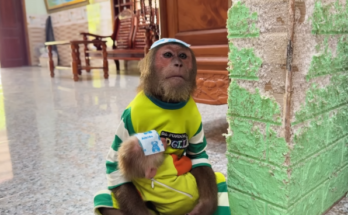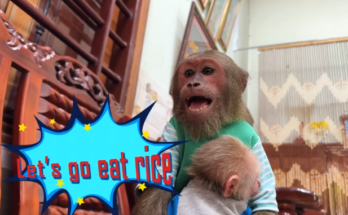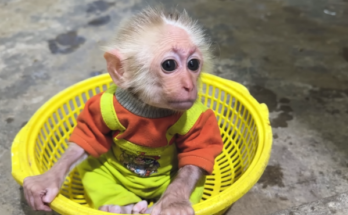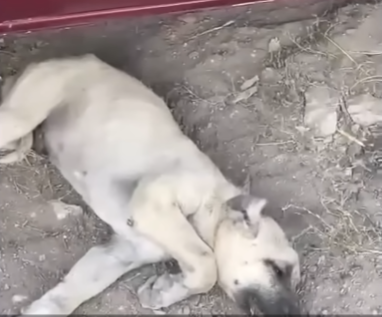
The morning market was already bustling. Vendors shouted their daily prices, pots clattered, and smoke from sizzling pans curled into the cool air. People rushed through the aisles, clutching baskets, bargaining for vegetables and meat. Amid the noise and movement, a small, frail dog weaved between the crowd—hoping, just once, someone might notice him.
He wasn’t always like this. Months ago, he had been a lively little stray who believed every hand reaching toward him meant kindness. But after countless kicks, shouted insults, and stones thrown in his direction, he learned to keep his head low and his steps quiet. Hunger drove him forward, but fear kept him trembling.
His ribs showed through his thin fur. His coat, once a warm brown, had faded into a rough, patchy mess. Yet even with the pain he carried—both in his stomach and his heart—he had hope this morning.
Because today, near the far corner of the market, the old man was cooking.
Everyone knew the old man. He owned a tiny street stall that sold rice porridge and fried dumplings. He wasn’t rich, but he was kind. Even the poorest customers called him “Grandpa Sareth.” Children loved him. Vendors respected him. And stray animals… well, many approached him, hoping for scraps.
The dog had watched Grandpa Sareth from a distance for weeks. He had never dared to get close. But today, hunger overpowered fear. He hadn’t eaten in nearly two days. His legs wobbled. His mouth watered at the smell of cooking broth.
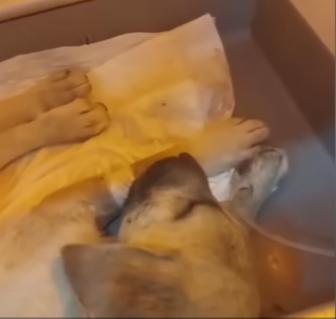
So he gathered what little courage he had and inched closer.
Step by shaky step.
Eyes lowered.
Tail tucked tightly.
He approached the old man’s stall.
Grandpa Sareth was stirring a pot of porridge when he noticed the dog. He paused. Customers around him paused too. The dog froze, thinking he had done something wrong. The world around him blurred as fear tightened his chest.
He only wanted leftovers—anything.
A bone.
A scrap.
A single crumb.
But what he got instead made his trembling worse.
A vendor nearby frowned.
“Eh! That dirty dog again! Chase him away before he scares customers!”
Another woman wrinkled her nose.
“He looks sick. Might have mange. Don’t let him near the food!”
A group of teenagers laughed cruelly.
“Look at that thing! Skin and bones. Someone throw water on it!”
The dog lowered himself to the ground, belly pressed to the dusty floor, his body instinctively preparing for impact. He remembered too many times when approaching food meant someone would yell or strike him.
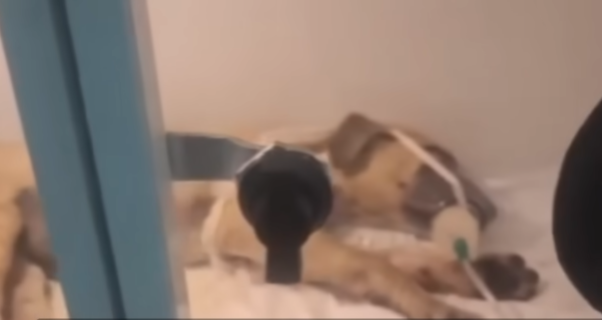
He whimpered softly.
But then—something unexpected happened.
The old man didn’t yell.
He didn’t kick.
He didn’t chase him away.
Instead, Grandpa Sareth turned to the rude vendor and said, “He’s hungry. That’s all.”
The vendor scoffed, but the old man ignored him.
He opened a small container, scooped a handful of warm porridge, added a piece of soft dumpling, and placed it gently on a banana leaf.
Then he stepped toward the dog.
The crowd watched, some shaking their heads, others curious, whispering.
The dog stared in disbelief. His legs trembled so hard he could barely stand. When the old man knelt to set the food in front of him, he flinched and crawled backward.
The old man didn’t move closer. He simply waited.
His voice was calm.
“You don’t have to be afraid. Eat, little one.”
The dog’s nose twitched. The smell wrapped around him like warm hands. He shuffled forward, inch by inch, his stomach growling louder than the market noise.
He took his first bite.
It was the first warm food he’d had in months.
But just as he swallowed, the heartbreaking moment arrived.
A man passing by kicked the dog from the side, shouting, “Get out of the way! These disgusting strays shouldn’t be fed!”
The dog yelped in pain, rolling onto the ground.
Gasps rippled through the nearby crowd, but no one stepped in—not yet.
The old man’s face changed completely. He rose slowly, his eyes sharp and filled with a quiet fury.
“That dog did nothing wrong,” he said. “He’s hungry. Just like any of us would be.”
The man shrugged. “Not my problem. It’s just a stray.”
But Grandpa Sareth didn’t back down.
“He is a life,” he said firmly. “And every life deserves kindness.”
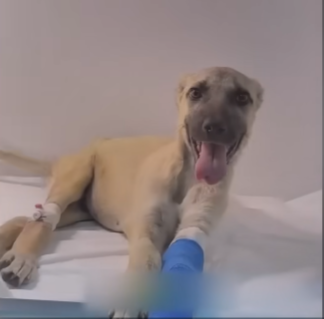
The man muttered angrily and walked away, but the damage had been done—the dog lay trembling, afraid to approach the food again.
Grandpa Sareth knelt beside him, gently checking his side. The dog whimpered but didn’t run. Something in the old man’s touch felt unfamiliar—comforting, safe.
“Come, little one,” he whispered. “Let’s get you fed.”
But even with the food right in front of him, the dog was too scared to move. Every instinct told him he would be punished again.
So Grandpa Sareth did something extraordinary.
He picked up the banana leaf with the food, sat down on the floor beside the dog, and began eating with him—small bite for himself, small piece placed gently beside the dog.
Slowly… painfully slowly… the dog crept forward.
He took another bite.
No kicks came.
No shouts.
Only warmth.
Only safety.
His tail twitched once—a tiny, fragile wag.
And that was the moment the old man smiled.
From that day on, the dog returned to the market every morning—not begging anymore, but following Grandpa Sareth like a shadow. The old man named him Chito.
The vendors who once mocked the stray gradually warmed up too. Not because they suddenly cared, but because they saw how Chito transformed.
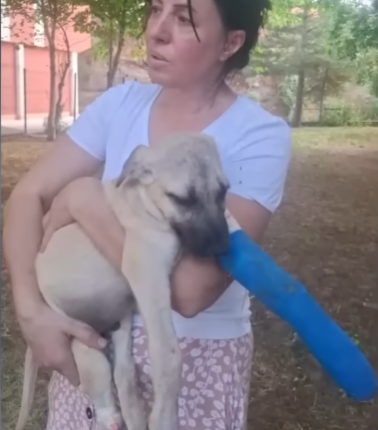
He started gaining weight.
His coat became shinier.
His tail wagged often.
He even began to greet customers.
Children loved him instantly.
But there was something else—something only the old man noticed.
Whenever someone raised their voice or made a sudden movement, Chito flinched violently. His eyes filled with terror, and he crouched low, expecting to be hurt.
That was his heartbreaking reminder of the life he came from.
And that’s why Grandpa Sareth made a promise.
“You will never be hurt again,” he told the dog. “As long as I’m here, you will eat, you will rest, and you will know love.”
Chito pressed his head against the old man’s knee.
A gesture of trust.
A silent thank you.
A beginning.
The dog who once begged for leftovers now had something more than food.
He had a place.
He had protection.
He had a family.
And his heartbreaking beginning turned into a beautiful second chance—because one old man believed that compassion can change even the most wounded life.
